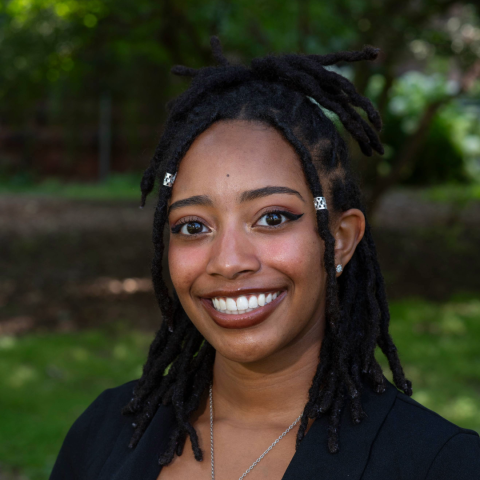McNair Scholar 2024 - Haniya Hopson
Haniya Hopson is a senior at the University of Minnesota, Twin Cities, double majoring in neuroscience and psychology. Her research interests revolve around developmental psychopathology and neurodevelopmental disorders, particularly autism. Haniya plans on getting her Ph.D. in Developmental Psychopathology and Clinical Science.
Quote from Haniya Hopson

My dream is to become a pediatric neuropsychologist, focusing on research to make early intervention for neurodevelopmental disorders like autism more accessible. I am dedicated to ensuring that girls and people of color, who are often late diagnosed or go undiagnosed, receive the timely and effective support they deserve.
Research project
Language Development Trajectories in Children with Agenesis of the Corpus Callosum
Abstract
This study characterizes longitudinal language development in children with agenesis of the corpus callosum (ACC), a congenital brain malformation. Participants were divided into four groups: Isolated ACC, Corpus Callosal Hypoplasia (CCH), Uncertain Dysgenesis, and ACC with other abnormalities (Plus). Data from typically developing children served as controls. Language development was assessed at 6, 12, 18, 24, and 36 months using the Vineland Adaptive Behavior Scales (VABS), MacArthur-Bates Communicative Developmental Inventories (MCDI), and Child Behavior Checklist (CBCL). The data were analyzed with mixed-effects linear regression models, Pearson correlations, and a logistic regression model for parental worry. Results showed that children with ACC have delayed language development with the Plus group showing greater delays. The regression models showed that the VABS highly predicted other scores, and the MCDI and CBCL were highly correlated. Language delay significantly increased parental worry, and parental worry significantly increased the probability of language delay.
Faculty mentor
Dr. Jed Elison is currently a Professor at the Institute of Child Development at the University of Minnesota. He earned his Ph.D. in Developmental Psychology from the University of North Carolina in 2011. Dr. Elison’s research focuses on early brain development and behavior, particularly in infants at risk for autism spectrum disorders. His lab employs neuroimaging techniques to study the developmental trajectories of brain and behavior in early childhood. Dr. Elison has published extensively in peer-reviewed journals and actively contributes to the scientific community through his research and mentorship of graduate students and postdoctoral fellows.